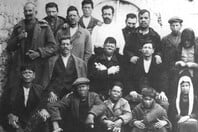Οι φίλες μου οι Εβραίες!Αν με το "Εβραίος" εννοούμε (μόνο) την μοντέρνα απόρροια αυτού: "Rabbinic Judaism or Rabbinism (Hebrew: "Yahadut Rabanit" - יהדות רבנית) has been the mainstream form of Judaism since the 6th century CE, after the codification of the Babylonian Talmud. Growing out of Pharisaic Judaism, Rabbinic Judaism became the predominant stream within the Jewish diaspora between the 2nd and 6th centuries, with the redaction of the oral law and the Talmud as the authoritative interpretation of Jewish scripture and to encourage the practice of Judaism in the absence of Temple sacrifice and other practices no longer possible."https://en.wikipedia.org/wiki/Rabbinic_Judaism... είναι -προφανώς- αναχρονιστική η χρήση του "Εβραίος", για την εποχή του Ιησού.Ποια λέξη, όμως, προϋπάρχει του Ιουδαίος; Μήπως το "Εβραίος";The difference between the two Greek terms Ioudaios and Hebraios is hard to define precisely. Usage varied considerably from time to time and place to place, but the basic distinctions seem to be as follows:(i) The ancient Israelites were Hebraioi, contemporary Jews Ioudaioi. So Josephus (37 – c. 100) says the Jews were originally called Hebrews and Tertullian, `those who are now called Jews were previously called Hebrews'? Hebrews (`Ibrim) is the name used in the Bible of the Israelites in Egypt; it was taken up by Jewish apologists, and plays a part too in Origen's theory of election, as will be seen.(ii) Although Ioudaioi in various places and periods was neutral in its connotations it did easily tend to take on derogatory overtones, in which case Hebraioi became the polite word for the Jews (iii) The adjective Hebra'ikos was of course used for the Hebrew language and alphabet,5 and so Hebraioi could refer to Hebrew- or Aramaic-speaking Jews as opposed to Hellenistai or Hellenes.http://watchmenservices.info/Books%20on%20Judaism%20and%20the%20History%20of%20the%20Jewish%20People/Nicholas_De_Lange-Origen_and_the_Jews__studies_in_Jewish-Christian_relations_in_third-century_Palestine%20(1976).pdfΣτο λεξικό: Εβραίος: 1α. Παλαιότερη (πριν από τον 4ο αι π.Χ) ονομασία των Ιουδαίων. 1β. αυτός που ανεξάρτητα από τον τόπο διαμονής και την πολιτική υπηκοότητά του κατάγεται από τον αρχαίο λαό της Παλαιστίνης και, κυρίως, πιστεύει στην μονοθεϊστική του θρησκεία (παίρνει και προσθήκες το 1β. εν τοιαύτη περιπτώσει).Να πάμε πιο πίσω, λοιπόν:"Second Temple Judaism refers to the religion of Judaism during the Second Temple period, between the construction of the second Jewish temple in Jerusalem in 515 BCE, and its destruction by the Romans in 70 CE. This period witnessed major historical upheavals and significant religious changes that would affect not only Judaism but also Christianity (which calls this the Intertestamental period). The origins of the authority of scripture, of the centrality of law and morality in religion, of the synagogue and of apocalyptic expectations." https://en.wikipedia.org/wiki/Post-exilicκαι ναι:"Properly speaking, Jews refer to the adherents of beliefs and practices associated with the Mishnah rather than the temple cult of Judea. Only by the third century had a Jewish religion really emerged, or a common pattern of religion irrespective of locale. The *predecessors* of the Jews, the Judeans, were localized and provincial, with a very different pattern of religion based on the temple cult. Given that the temple's destruction in 70 CE was "the ancient world's equivalent of a nuclear explosion" (Donald Akenson, Saint Saul, p 62) -- forever changing the religion of the chosen people -- we should take seriously distinguishing between Judeans and later Jews."http://lorenrosson.blogspot.gr/2006/06/jew-or-judean-translating-ioudaiou.htmlThe Israelites were a Semitic Hebrew-speaking people of the Ancient Near East, who inhabited part of the Land of Canaan during the tribal and monarchic periods (15th to 6th centuries BCE), later evolving into the Jews and Samaritans of the Hellenistic and Roman periods, inhabiting the territories of Judea and Galilee, and Samaria respectively, though a Jewish diaspora had already developed outside of Judea and Galilee.For the post-exilic period, beginning in the 5th century BCE, the remnants of the Israelite tribes *came to be referred to as Jews* (tribes of Judah, Simeon, Benjamin and partially Levi), named for the kingdom of Judah. This change is explicit in the Book of Esther (4th century BCE). On the other hand, Samaritans (tribes of Menasseh, Ephraim and partially Benjamin and Levi) became named for Samaria.https://en.wikipedia.org/wiki/Twelve_Tribes_of_IsraelΕπίσης την εποχή του Ιησού δεν υπήρχαν πια 12 φυλές (αν αυτές υπήρξαν, με όχι ακριβώς τη βιβλική έννοια) ..."The Ten Lost Tribes of Israel refers to those tribes of ancient Israel that formed the Kingdom of Israel, and which disappeared from biblical and all other texts after the kingdom was destroyed in about 722 BCE by Assyria.""Modern Jews, moreover, trace their lineage to the tribes of Judah and Benjamin (absorbed by Judah) or to the tribe, or group, of clans of religious functionaries known as Levites. This situation was brought about by the Assyrian conquest of the Kingdom of Israel in 721 bc, which led to the partial dispersion of the 10 northern tribes and their gradual assimilation by other peoples. (Legends thus refer to them as the Ten Lost Tribes of Israel.)"http://www.britannica.com/EBchecked/topic/307146/JudahΛεξικό μου δείνει το Ιουδαίος ως εξής: Αυτός που ανήκει στο έθνος των Ιουδάιων, στους Εβραίους της αρχαίας Παλαιστίνης.και 2ο λεξικό: Ο πιστός της Ιουδαϊκής θρησκείας, ο Εβραίος (κυρίως στην ελληνορομαίκή εποχή)"Judean" (Ioudaios) is an admittedly slippery term; K.C. Hanson and Douglas Oakman list five possible meanings depending on context: (1) the inhabitants of Judah, distinct from Galilee, Samaria, Perea, Idumea, etc; (2) all the inhabitants of Palestine, including Galilee, Samaria, Perea, Idumea, etc; (3) all those in the Mediterranean and Middle-East with ethnic connections to Judah; (4) all those professing allegiance to the state religion of Judah (even if converts); (5) the elites of Judah (as opposed to peasants). (See Palestine in the Time of Jesus, p 176)http://lorenrosson.blogspot.gr/2006/06/jew-or-judean-translating-ioudaiou.htmlΟ Ιησούς ο Ναζαρέος, ήταν από τη Γαλιλαία, μεν, αλλά ποιοι απήρτιζαν -πληθυσμιακά- τη Γαλιλαία την εποχή του Ιησού;"One major question is exactly how "Jewish" the Jews of Galilee really were in the Post-Exile period. For most laymen, the question itself is somewhat surprising. They would ask, "Hasn't Galilee been Jewish since the Twelve Tribes conquered Israel in the 13 century BCE?" The best answer to this question is, yes and no.""The problem can be traced back to historical developments in Ancient Israel, long before the time of Jesus. Galilee was settled by the tribes of Zebulon, Naphtali, Issachar and Asher." "The region later belonged to David's kingdom and then to the northern nation of Israel. The situation was straightforward enough until the Assyrians under Emperor Tiglath-Pileser III conquered Israel in 733 BCE, and obliterated the kingdom entirely under his successor Shalmaneser V in 722. Most historians believe that the victorious Assyrians, as was their custom, evacuated and relocated the entire population out of the Galilee and replaced them with other peoples from their far-flung empire.""Another school of thought, however, says that when the Assyrians conquered Israel and evacuated the Galilee, they left the land virtually empty.""Who were these new inhabitants? These new archaeological findings indicate that they were transplanted Judeans. The ancient historian Josephus relates how Alexander Jannaeus, the King of Israel from 102 to 76 BC, extended the northern boundary of his Judean-centered country into Galilee during his reign using military means."http://www.travelujah.com/articles.php?action=viewarticle&articleID=40Επίσης ο Ιησούς δεν υποτείθεται ότι ήταν από το πιο ισχυρό Εβραϊκό λινεάζ: In Matthew 1:1-6 and Luke 3:31-34 131 of the New Testament, Jesus Christ is described as a member of the tribe of Judah by lineage.The Gospels, Acts of the Apostles and Pauline epistles refer to Jesus of Nazareth as a descendant of David (tribe of Judah).(Τουλάχιστον πρόγονος των "μοντέρνων" Εβράιων γαρ, με τις όποιες ιστορικές-εθνολογικές συμβάσεις δυνάμεθα να κάνουμε και 'μείς άλλωστε, για την "ελληνικότητα" του λινεάζ μας;).
























